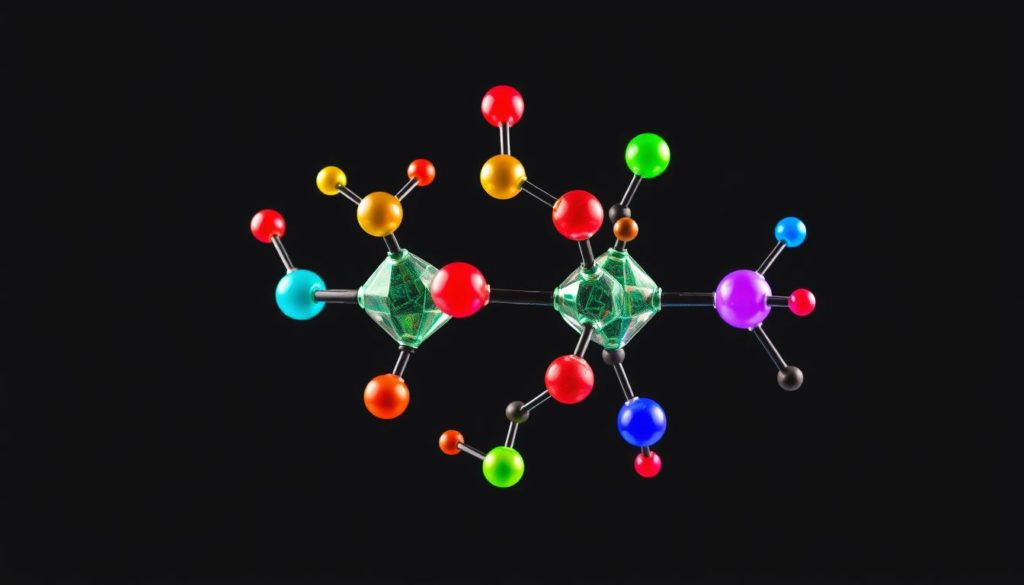Dinitrophenol (DNP) was once famous for helping people lose weight in the 1930s. It was later banned because of serious health dangers. DNP can quickly raise your metabolism, which attracted those wanting fast results, despite the risks.
Nowadays, some bodybuilders still use it to get ahead in competitions. Knowing all about DNP’s dangers and its history is very important. It helps keep everyone safe and informed.
What is Dinitrophenol (DNP)?
Dinitrophenol, or DNP, is a chemical with a rich history and notable properties. It was first found in the munitions industry. Workers exposed to DNP lost a lot of weight by accident, leading to more research.

Chemical Properties
DNP’s chemical properties are fascinating. It’s a small molecule that can move through biological membranes. This lets it disrupt a key cellular process, causing the body to generate heat and burn more energy. Its structure, featuring two nitro groups, makes it a powerful agent for metabolism.
History and Discovery
The history of DNP goes back to France in the early 20th century. It was first used in explosives manufacturing. Workers exposed to DNP had higher body temperatures and lost weight quickly. This led to research on DNP for weight loss. Despite its effectiveness, its dangerous side effects led to a ban on its use by humans in 1938. Yet, DNP’s story remains an important part of metabolic agent studies.
| Aspect | Description |
|---|---|
| Category | Chemical Compound |
| Key Property | Uncouples Oxidative Phosphorylation |
| Historical Use | Explosives and Weight Loss Agent |
| Initial Discovery | Early 20th Century, France |
| Prohibition Year | 1938 |
The Controversial Use of DNP in Weight Loss
Dinitrophenol (DNP) has long been a subject of weight loss controversies. It draws attention for its rapid fat loss effects. But, it comes with dangerous side effects.

How DNP Works as a Fat Loss Supplement
DNP disrupts ATP production by messing with mitochondria. This makes the body burn more fat, leading to fast weight loss. However, it also brings serious risks like hyperthermia and death.
The Bodybuilding Connection
In bodybuilding, DNP is popular for its fat-burning power, despite its dangers. Forums buzz with users sharing their experiences and tips. But, legal and health risks loom over these discussions.
| Aspect | Details |
|---|---|
| Mechanism | Uncouples oxidative phosphorylation |
| Metabolic Impact | Increases metabolic rate significantly |
| Primary Appeal | Rapid fat loss |
| Risks | Hyperthermia, potential death |
Health Risks Associated with DNP
Using DNP can be very risky, often with serious outcomes. The most crucial side effect is deadly hyperthermia, where the body overheats in a dangerous way. This condition, along with faster heartbeats and a lot of sweating, are frequent health issues.
Other negative effects include skin rashes and cataracts. More severe cases have reported nerve damage and a significant drop in white blood cells. The danger grows because even a small overdose can have effects within hours. Sadly, a big overdose could be fatal in less than a day.
It’s key to spot overdose signs early for a chance at helping. These signs could be fast breathing, fever, feeling sick, throwing up, and in the worst cases, coma or death. The quick start of these signs shows why it’s critical to get medical help fast if DNP exposure is suspected.
| Health Complications | Description |
|---|---|
| Hyperthermia | Dangerous overheating of the body, potentially fatal. |
| Tachycardia | Increased heart rate, leading to potential heart complications. |
| Diaphoresis | Excessive sweating, often linked with other severe symptoms. |
| Peripheral Neuritis | Nerve damage leading to pain, weakness, and other issues. |
| Agranulocytosis | Severe reduction in white blood cells, compromising immune response. |
| Overdose Symptoms | Rapid onset of symptoms such as hyperthermia, vomiting, and in extreme cases, death. |
The Legal Status of DNP
The legal situation around Dinitrophenol (DNP) is complex. It has changed a lot since it was first found. This substance was first seen in industrial work. But soon, its misuse and the risk it posed to health became clear. This led to careful monitoring and rules.
Regulatory History
The regulation of DNP began when the bad health effects were spotted. At first, there weren’t many rules. But as more cases of harm and misuse appeared, the need for strict rules was clear. By the 1930s, the FDA stepped in. It recognized DNP’s dangers and put it under strict laws.
Current Laws and Regulations in the United States
In the US, DNP is now seen as unsafe for eating. The FDA has clearly banned its sale for diet reasons. This is because it’s very toxic. But there are still challenges in enforcing these laws. Especially with online shops around.
Work is being done to fix the gaps in the law. Regulatory groups and law enforcement are working together more. This helps stop illegal sales. It’s very important for buyers and sellers in the US to know these rules. They should follow the laws on DNP carefully.
| Year | Event | Outcome |
|---|---|---|
| 1930s | Initial reports of misuse | Increased scrutiny |
| 1938 | FDA intervention | Ban on human consumption |
| Present | Online sales surveillance | Tighter enforcement |
Understanding the Mechanism of Action of DNP
To grasp how Dinitrophenol (DNP) works, it’s key to know about its action method first. DNP affects how cells handle energy significantly.
Oxidative Phosphorylation Uncoupling
DNP mainly works by messing with oxidative phosphorylation. This process happens in mitochondria, making ATP, which cells use for energy. DNP breaks this cycle. Instead of making ATP, energy turns into heat. This reduces ATP but makes the body warmer.
Because of this uncoupling, energy use gets less efficient. Calories are burned but don’t properly turn into cellular energy. DNP causes an intentional wastage of energy this way.
Impact on Metabolic Rate
DNP’s effect raises the metabolic rate. Since ATP production goes down, the body burns more calories to keep up. This can speed up fat loss, which is why it’s used for losing weight. Yet, DNP’s actions are risky. The extra heat can cause serious hyperthermia and other health problems. Knowing these effects and dangers is vital when thinking about using DNP.
Real-Life Cases of DNP Poisoning
There are real stories about DNP poisoning incidents that show its risk. People have died or gotten very sick from DNP. This is true for both accidents and using DNP for weight loss.
- A 23-year-old man took DNP tablets to lose weight. He got very sick and his organs failed.
- A fitness lover took DNP for better muscles but faced extreme body heat and heart failure.
- Workers got exposed to DNP by accident. They had to be rushed to the hospital for serious toxicity.
It’s key to know how dangerous DNP can be as a weight loss pill. It’s very easy to take too much. Even a small overdose can be fatal. Here’s a summary table of these true stories:
| Case | Age | Reason | Outcome |
|---|---|---|---|
| Case 1 | 23 | Weight Loss | Multi-Organ Failure |
| Case 2 | Fitness Enthusiast | Muscle Definition | Cardiac Arrest |
| Case 3 | Industrial Workers | Accidental Exposure | Systemic Toxicity |
The stories of DNP poisoning incidents show why we need to be careful. We must spread the word and make rules stricter to stop more sad events.
Side Effects of DNP
Dinitrophenol (DNP) comes with serious health risks. These range from short-term problems to long-lasting harm. It’s vital for users or those thinking about DNP to know these dangers.
Short-Term Side Effects
Some symptoms can arise quickly after using DNP.
- Excessive sweating
- Severe fatigue
- Dyspnea (difficulty breathing)
These issues may become serious very fast and need urgent care.
Long-Term Health Consequences
DNP’s chronic effects are even more severe. The harm from long-term use can last forever.
| Symptoms | Description |
|---|---|
| Cataract Formation | Long-term DNP usage can cause cataracts, making your vision worse forever. |
| Hearing Damage | It can harm your hearing, leading to loss of hearing. |
| Systemic Failures | Severe reactions to DNP can cause failures in key body systems. |
The lasting health issues from DNP can be truly harmful. Considering these risks is crucial before deciding on DNP use.
Is DNP Still Used in Modern Times?
Despite major regulations, DNP still concerns many. It shows that problems remain despite attempts at strict control.
DNP’s Illicit Market
The illicit trade of DNP flourishes online, focusing on health and fitness lovers. People desiring quick weight loss turn to DNP, even though it’s very risky. This hidden market uses web forums and online stores, avoiding laws to keep selling.
Continued Research and Potential Uses
Research on DNP continues, looking for safer uses. Experts are studying how it might help with obesity and some metabolic disorders. With careful safety steps, its medical use could open new treatment paths, despite its dangers.
Potential Industrial and Non-Medical Uses for DNP
Dinitrophenol (DNP) is known for more than weight loss. It has many industrial and non-medical uses. Over time, DNP has shown how useful it can be outside of medicine.
As a Historical Pesticide
One of DNP’s first roles was as a historical pesticide. It was used in farming to fight pests. Although it worked well, safety concerns stopped its use.
Other Industrial Applications
DNP has been important in chemical manufacturing too. It has been part of making things like explosives and dyes. Some applications include:
- Production of Explosives: It was crucial for making bombs for the military and mining.
- Synthesis of Dyes: DNP helped create bright, lasting dyes for textiles.
- Wood Preservatives: It protected wood from decay and bugs.
These roles highlight DNP’s historical importance and versatility.
| Industry | Application | Outcome |
|---|---|---|
| Agriculture | Pesticides | Effective pest control but stopped due to safety |
| Military/Mining | Explosives | Important for making explosives |
| Textile | Dye Synthesis | Made vibrant, long-lasting dyes |
| Construction | Wood Preservatives | Stopped wood decay and pests |
Knowing these DNP industrial uses lets us see its value historically and maybe in the future too.
Treatment of DNP Overdose and Poisoning
When someone overdoses on DNP, care focuses on symptoms and stopping more poison absorption. There’s no antidote for DNP. Fast identifying symptoms and acting quickly are key to saving lives. Emergency treatment starts with cooling down the body fast to fight the dangerous rise in temperature DNP causes.
To treat DNP poisoning, doctors give cooled IV fluids. This helps keep the patient hydrated and supports their body functions. They might also use ice packs or cooling blankets to get the patient’s temperature down quickly.
In serious cases, patients need care in an ICU. This lets doctors watch them closely and use advanced treatments. The ICU team works to keep the heart stable, prevent seizures, and handle other dangers from DNP. The goal is a thorough plan to give patients the best chance of recovery.
FAQ
What is Dinitrophenol (DNP)?
Dinitrophenol, or DNP, is a chemical that changes how our bodies use energy. It was used in making things and to help lose fat by boosting metabolism.
How does DNP work as a fat loss supplement?
DNP makes a change in our cells that stops them from making energy properly. This makes our body heat up and burns fat fast, but not safely.
Why is DNP controversial in weight loss?
DNP’s ability to burn fat quickly comes with big health risks like overheating, fast heart rate, and even death. That’s why it’s a controversial choice for losing weight.
What are the health risks associated with DNP?
Using DNP can cause serious issues like overheating, fast heart rate, sweating a lot, skin issues, eye problems, nerve damage, and might lead to death. Overdose effects are rapid and dangerous.
What is the legal status of DNP in the United States?
DNP is illegal for eating or drinking in the US because it’s very dangerous. There are ongoing efforts to stop it from being sold illegally, especially online.
Can DNP still be found in the modern market?
Yes, DNP can still be found illegally, mainly online. Some in the fitness world risk using it to quickly lose fat, despite its dangers and being illegal.
What are the short-term side effects of DNP?
Short-term, DNP causes lots of sweating, feeling very tired, shortness of breath, and sweating. These signs show the body trying to handle the rapid metabolism increase.
What long-term health consequences can result from DNP use?
Over time, DNP can cause eye damage, permanent vision loss, hearing issues, and organ failure. Long exposure leads to serious health problems that may not be fixable.
How is DNP poisoning treated?
There’s no specific cure for DNP poisoning. Treatments include cooling the body for overheating, giving fluids, and intense care. Quick medical help is essential.
What historical uses did DNP have in industry?
DNP was used as a bug killer and in making explosives, colors, and foods safe. Now, it’s used less because it’s toxic and there are safer options.


